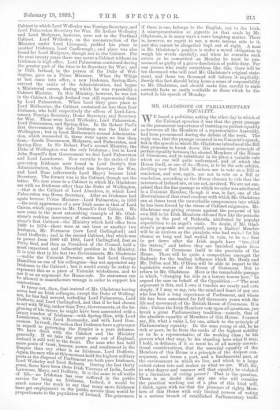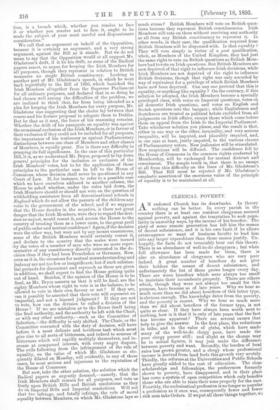MR. GLADSTONE ON PARLIAMENTARY EQUALITY.
WE heard. a politician asking the other day in which of the Unionist speeches it was that the great passage on the paramount importance of insisting on perfect equality as between all the Members of a representative Assembly, had been pronounced during the debate of the week. The reply was, that the passage occurred in no Unionist's speech, but in the speech in which Mr. Gladstone introduced the Bill that proposes to break down this paramount principle of perfect equality between the elected Members of the House of Commons, and to substitute in its place a variable rule which no one will quite understand, and of which the House itself, or one of its officers, is to be the sole arbiter, deciding now that Irish Members are to vote on a Bill or resolution, and now, again, are not to vote on a Bill or resolution, according as the House chooses to rule that the interests of Ireland are, or are not, involved. We are not sur- prised that the fine passage to which we refer was attributed to a Unionist Member, though it was, in fact, one of the illustrations of that cruel candour with which Mr. Gladstone can at times treat the unworkable compromises into which he has been forced by the stress of Cabinet exigencies. Mr. Gladstone was giving reasons against the proposal of his own Bill to let Irish Members ebb and flow like the periodic spring in the pool of Bethesda, attributed by popular superstition to an angel's visits. No doubt, if Mr. Glad- stone's proposals are accepted, many a Radical Member will be as anxious as the paralytic who had waited for his chance so long and had waited in vain, to be the first to get down after the Irish angels have " trot.bled the waters," and. before they are banished again from the House of Commons itself to the precincts of the House. There will be quite a competition amongst the Radicals for the healing influence which Mr. Healy and Mr. Dillon and Mr. O'Brien will be able to impart to the legislative waters of the House of Commons. But to return to Mr. Gladstone. Here is the remarkable passage in which, "changing his side as a lawyer knows how," he argued. the case on behalf of the Opposition :—" The next argument is this, and. I own it touches me nearly and cuts deeply, if I may so say, into the mind and heart of any one who has had a long experience of Parliament, and whose life has been associated for full threescore years with the life and movement of the British House of Commons. It is this : Unless the Irish Members vote upon all questions, you break a great Parliamentary tradition—namely, that of the absolute equality of Members of this House. I cannot say, Sir, what a value I, for one, attach to the principle of Parliamentary equality. Be the man young or old, be he rich or poor, be he from the ranks of the highest nobility or be he a representative of the working class ; be his powers what they may, be his standing here what it may, I hold, in defiance, if it so must be, of all merely conven- tional considerations, that the essential equality of the Members of this House is a principle of the deepest con- sequence, and forms a part, and a fundamental part, of the environment in which we live, and which to a large extent enters into and makes us what we are. Well, Sir, in what degree and manner will that equality be violated. by a limitation of voting power P That is the question. There is no doubt that any one who will consider the practiCal working out of a plan of this kind will, I think, agree with me that the presence of eighty Mem- bers of this House with only limited. powers of voting is a serious breach of established Parliamentary tradi- tion, is a breach which, whether you resolve to face it or whether you resolve not to face it, ought to be made the subject of your most careful and dispassionate consideration."
We call that an argument on behalf of the Opposition, because it is certainly an argument, and a 'very strong argument, against the Bill as it stands. But we do not mean to say that the Opposition would at all support Mr. Gladstone's drift, if it be his drift, as some of the Radical papers assert, to argue for keeping the Irish Members for all purposes, though they represent in relation to British measures no single British constituency. Looking to another past of Mr. Gladstone's speech, in which he went back regretfully to the Bill of 1886, which banished the Irish Members altogether from the Supreme Parliament for all ordinary purposes, and declared that in so doing he had chosen well among the difficulties of the problem, we are inclined to think that, far from being intended as a plea for keeping the Irish Members for every purpose, Mr. Gladstone was suggesting that the choice lay between that course and his former proposal to relegate them to Dublin. But be that as it may, the force of his reasoning remains. Whether the drift of his panegyric on equality was against the occasional exclusion of the Irish Members, or in favour of their exclusion if they could not be included for all purposes, the importance of his testimony as against Parliamentary distinctions between one class of Members and other classes of Members, is equally great. Nor is there any difficulty in grasping its full significance. In the case of this particular Bill, it is, as we understand Mr. Bryce, proposed to lay down :general principles for the inclusion or exclusion of the Irish .Members' votes, but to let the application of those principles to the particular case be left to the House of eCommons, whose decision shall never be questioned in any -Court of Law. If, for instance, to refer to a possible case which we have ourselves adduced in another column, the House be asked whether, under the rules laid down, the Irish Members should or should not vote on the question of withholding assistance from all denominational schools in England which do not allow the parents of the children any 'voice in the government of the school, and if we suppose that the House decides in the negative, is there not great danger that the Irish Members, were they to regard the deci- sion as unjust, would resent it, and accuse the House to the country of treating them as a lower caste, to the great peril of public order and mutual confidence? Again, if the decision were the other way, but were not by any means unanimous, some of the British Members would certainly resent it, -and declare to the country that the scales were turned by the votes of a number of men who were no more repre- rsentative of any constituency directly interested in the de- .cision than if they had been Frenchnlen or Germans. Now, -even as it is, the occasions for mutual misunderstanding and jealousy are not too few or insignificant; but if such substan- tial grounds for discontent and reproach as these are given in addition, we shall expect to find the House getting quite out of hand. Besides, if the opinion of the House is to be final, as Mr. Bryce assures us that it will be final, are the eighty Members whose right to vote is in the balance, to be allowed to vote in their own favour or not ? If they are, -can it possibly be asserted that their vote will represent an • 'impartial, and not a biassed judgment ? If they are not to vote, how can the division be called a division of the House ? If we are mistaken as to the House itself being the final authority, and the authority be left with the Chair, -or with any other authority,—such as the Committee of Selection,—the difficulty is only shifted. The Chair, or the Committee entrusted with the duty of decision, will have before it a most delicate and invidious task which must give rise to all sorts of bitterness, and indeed to sources of bitterness which will rapidly multiply themselves, and in- crease at compound interest, with every angry dispute. The evils following from the infringement of the rule of equality, on the value of which Mr. Gladstone so elo- quently dilated on Monday, will evidently, in any of. these cases, be most serious and injurious to the reputation of the House of Commons. But now, take the other solution, the solution which the Radical papers so urgently demand,—namely, that the Irish Members shall remain for all purposes, and vote as freely upon British Bills and British resolutions as they do on Imperial Bills and Imperial resolutions. Will not that too infringe, and fatally infringe, the rule of moral equality between Members, on which Mr. Gladstone lays so much stress ? British Members will vote on British ques- tions because they represent British constituencies. Irish Members will vote on them without receiving any authority at all from any British constituency to represent it. In other words, in their case, the qualification required from British Members will be dispensed with. Is that equality ? They will vote simply in virtue of a past qualification, when, as Members of the United Kingdom, they had just the same right to vote on British questions as British Mem- bers had to vote on Irish questions. But British Members are now deprived of that right to influence Irish decisions, while Irish Members are not deprived of the right to influence British decisions, though that right was only accorded by way of equivalent for a privilege of which British Members have now been deprived. Can any one pretend that this is equality, or anything like equality ? On the contrary, if this solution be adopted, the Irish Members become a specially privileged class, with votes on Imperial questions, votes on all domestic Irish questions, and votes on English and Scotch questions into the bargain.; while Englishmen and Scotchmen are treated as political helots excluded from all judgments on Irish affairs, except those which come before them on appeal from the Irish to the Imperial Parliament. Take whichever solution you please, and the result is that, either in one way or the other, inequality, and very serious inequality, will be imputed, and plausibly imputed, and, in one case at least, justly imputed, to the various classes of Parliamentary voters. New jealousies will be stimulated. New suspicions will be diffused. The confidence felt by the House of Commons in the common rights conferred by Membership, will be exchanged for mutual distrust and resentment. The simple truth is, that there is no escape at all from this difficulty on the lines of Mr. Gladstone's . Bill. That Bill must be rejected if Mr. Gladstone's emphatic assertion of the enormous value of the principle of equality is to be maintained at all.



































 Previous page
Previous page